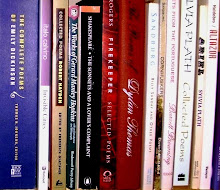Over several months this past year, I went through a large pile (almost a ream) of photocopied poetry I'd collected over the years, culling almost all of it. I decided I would only keep those that were satisfying both in language and in meaning for me, or which affected me very strongly because of the use of language or the meaning. Much as I like the linguistic fireworks of Albert Goldbarth, I saved only one of his poems. In fact, it was reduced to a pretty thin pile which I've been typing into my computer so that I can ditch the paper copies. And reading over what was left, I realized I probably should have culled even more but left well enough alone.
It is with this new stricter standard in mind that I looked over selections I'd marked in the first 250 pages of the anthology of world poetry (which is a 1250 pg tome) and found much wanting. Quite a bit of what I marked amused me and much of it was out of sociological interest--I found it interesting and amusing that we shared such similar sentiments with ancient Romans.
By Martial:
You are a stool pigeon,
A slanderer, a pimp and
A cheat, a pederast and
A troublemaker. I can't
Understand, Vacerra, why
You don't have more money.
tranlated by Kenneth Rexroth
On a gentler note, from ancient India, by Prakrit:
Lone Buck
in the clearing
nearby doe
eyes him with such
longing
that there
in the trees the hunter
seeing his own girl
lets the bow drop
Translated by Andrew Schelling
But I find that what moves me the most both from among the poetry in my collected ream and from those circled in this volume are those of tribute or celebration, poetry with either a touch or a load of the ecstatic.
By Propertius:
O Best of All Nights, Return and Return Again
How she let her long hair down over her shoulders, making a love cave, around her face. Return and return again.
Translated by James Laughlin, this goes on to list other details of intimacy with that refrain.
And I like poems of artful and powerful clarity such as this one, also by the Indian Prakrit:
These women plunder my husband
as if he were plums
in the bowl of a blind man.
But I can see them, clear as a cobra.
Translated by David Ray
Anger and the drive to revenge is so palpable in that simple 5 line poem.
There are a few other curiousities and beauties but no time to share them and I feel it's best to end this review and move forward in the book.
Subscribe to:
Post Comments (Atom)

No comments:
Post a Comment